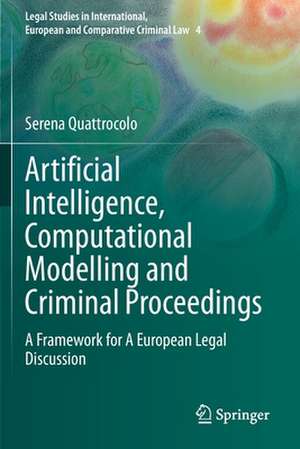Artificial Intelligence, Computational Modelling and Criminal Proceedings: A Framework for A European Legal Discussion: Legal Studies in International, European and Comparative Criminal Law, cartea 4
Autor Serena Quattrocoloen Limba Engleză Paperback – 28 aug 2021
| Toate formatele și edițiile | Preț | Express |
|---|---|---|
| Paperback (1) | 778.94 lei 43-57 zile | |
| Springer International Publishing – 28 aug 2021 | 778.94 lei 43-57 zile | |
| Hardback (1) | 784.92 lei 43-57 zile | |
| Springer International Publishing – 28 aug 2020 | 784.92 lei 43-57 zile |
Preț: 778.94 lei
Preț vechi: 949.94 lei
-18% Nou
Puncte Express: 1168
Preț estimativ în valută:
149.05€ • 156.01$ • 124.06£
149.05€ • 156.01$ • 124.06£
Carte tipărită la comandă
Livrare economică 31 martie-14 aprilie
Preluare comenzi: 021 569.72.76
Specificații
ISBN-13: 9783030524722
ISBN-10: 3030524728
Ilustrații: XVII, 230 p. 1 illus.
Dimensiuni: 155 x 235 mm
Greutate: 0.35 kg
Ediția:1st ed. 2020
Editura: Springer International Publishing
Colecția Springer
Seria Legal Studies in International, European and Comparative Criminal Law
Locul publicării:Cham, Switzerland
ISBN-10: 3030524728
Ilustrații: XVII, 230 p. 1 illus.
Dimensiuni: 155 x 235 mm
Greutate: 0.35 kg
Ediția:1st ed. 2020
Editura: Springer International Publishing
Colecția Springer
Seria Legal Studies in International, European and Comparative Criminal Law
Locul publicării:Cham, Switzerland
Cuprins
Part I: Introducing the Problem.- 1. Approaching the Unknown: Some Preliminary Words.- 2. A Theoretical Framework for the Discussion on AI and Criminal Law.- Part II Direct and Indirect Impact of Widespread Computational Modelling on Evidence Gathering.- 3. Hacking by Law-Enforcement: Investigating with the Help of Computational Models and AI Methods.- 4. Equality of Arms and Automatedly Generated Evidence.- Part III: Challenges of Computational Methods to the Judicial Decision-Making Process: Deciding v. Predicting.- 5. Predictability and Criminal Justice.- 6. Predictability of Violent Behaviour and Recidivism.- 7. Predictability and the Criminal Justice Decision-Making Process.- 8. The Gist of the Inquiry.
Notă biografică
Serena Quattrocolo is Full Professor of Italian and European Criminal Procedure at the University of Eastern Piedmont, Dean of the Law School, former academic co-director of the Center for Transnational Legal Studies, London. Major research fields: European and comparative criminal procedure, Italian criminal procedure. In recent years, the focus turned to applications of AI to criminal justice and automatedly generated evidence.
Textul de pe ultima copertă
This book discusses issues relating to the application of AI and computational modelling in criminal proceedings from a European perspective. Part one provides a definition of the topics. Rather than focusing on policing or prevention of crime – largely tackled by recent literature – it explores ways in which AI can affect the investigation and adjudication of crime. There are two main areas of application: the first is evidence gathering, which is addressed in Part two. This section examines how traditional evidentiary law is affected by both new ways of investigation – based on automated processes (often using machine learning) – and new kinds of evidence, automatically generated by AI instruments. Drawing on the comprehensive case law of the European Court of Human Rights, it also presents reflections on the reliability and, ultimately, the admissibility of such evidence. Part three investigates the second application area: judicial decision-making, providing an unbiased review of the meaning, benefits, and possible long-term effects of ‘predictive justice’ in the criminal field. It highlights the prediction of both violent behaviour, or recidivism, and future court decisions, based on precedents. Touching on the foundations of common law and civil law traditions, the book offers insights into the usefulness of ‘prediction’ in criminal proceedings.
Caracteristici
Provides the first comprehensive review of European approaches to the application of AI in criminal proceedings Provides a cutting-edge legal perspective on AI in criminal proceedings Provides an unbiased, multi-disciplinary review of AI in criminal proceedings








